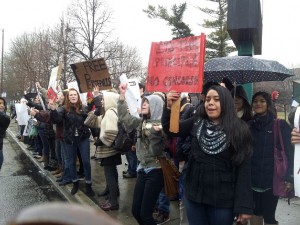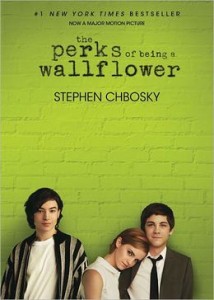
Students, teachers, and parents protest the Persepolis ban outside Lane Tech College Prep (source: Banned Books Week)
Recent attempts to ban Marjane Satrapi’s Perseoplis and Stephen Chbosky’s The Perks of Being a Wallflower have been met with vocal opposition. Central to these protests are students themselves, and their vociferous protests and savvy with social media helped prevent the removal of these acclaimed books.
In the August 2013 edition of The Illinois Library Association Reporter, Kids’ Right To Read Project head Acacia O’Connor examined how youth voices contributed to the defense of Perks in Glen Ellyn, Illinois, where a school board initially decided to remove the book from classrooms despite a review committee’s recommendation otherwise. When the school board reviewed the decision, students were among the first in line to fight the removal:
Over the course of the deabate, half a dozen Hadley eight-graders signed up to speak at school board meeting. They told the board that The Perks of Being a Wallflower, far from harming them, had helped them deal with their own feelings of depression, struggling to belong, or being alone.
 Perks has been widely praised for its candid treatment of teenagers, touching on topics such as suicide, sexual abuse, homosexuality, masturbation, and drug use. These topics have also led to widespread challenges of the book, frequently putting it on ALA’s annual list of the most challenged and banned books. Students argued that they shouldn’t be sheltered from such topics:
Perks has been widely praised for its candid treatment of teenagers, touching on topics such as suicide, sexual abuse, homosexuality, masturbation, and drug use. These topics have also led to widespread challenges of the book, frequently putting it on ALA’s annual list of the most challenged and banned books. Students argued that they shouldn’t be sheltered from such topics:
“We should be able to educate ourselves about topics such as sex, homosexuality, rape, and depression, which are discussed in this specific book,” said eigth-grader Nicole Capp. “These are real issues that need to be taught to kids my age because not only will we encounter some of these problems in high school, we have already encountered aspects of these issues in middle school.”
An essential component to the defense of Perks was a You Tube video made by Maddie Griffin and Maddie Howard, students in the Glen Ellyn system. Maddie and Maddie didn’t like the idea that adults thought they didn’t and shouldn’t have a voice in the decision, so they made an impassioned plea for Perks, a plea that gained attention on the national stage, with links on media outlets such as Huffington Post.
What many consider is the final deciding factor in the Perks case is the involvement of acclaimed author Judy Blume, who is no stranger to censorship. Blume’s campaign on behalf of the book boosted the protest again the ban. However, the book may not have received support from such a renown author had the students themselves not told Blume about what was happening in Glen Ellyn.
Further, the students demonstrated a mature grasp of the themes in Perks, how the book is a valuable resource for developing teens, and how a small group of people should not determine what is best for everyone. The Illinois Library Association Reporter also shared the perspectives of several Glen Ellyn students, among them Maddie Howard:
…Children and parents should establish an open connection with each other. If we as teenagers are unable to speak with our parents about problems occuring within our life, who else are we to go to? It was wonderful that these kids felt going to their parents and earnestly telling them they felt uneasy reading the mature content included in Perks. However, this is no reason to strip their fellow students from the opportunity to read this remarkable piece of literature…
Student Olivia Mullenax, also reiterated the importance of open communication between parents and children, but she also reminded adults to recognize that teens do not live in a bubble:
…I do recognize that there is mature content in the book, but I think that I am mature enough to handle it. I know when to stop reading if something makes me uncomfortable, and if I am confused, I know my parents are there to talk. Like it or not, eighth-graders at our school are already exposed to such language in the book on a daily basis at Hadley…
Student Nicole Clapp spoke about censorship and how it interferes with the ability to educate oneself and to form personal opinions:
…Censorship to me is wrong because I believe it restricts and limits our ability to learn about worldly topics and our ability to grow up educated about drugs, alcohol, sex, politics and world history, to name a few issues. I belive that it doesn’t allow us to form opinions that are different from our parents. One of the main things that I took away from researching censorship is schools is that it really does affect kids because we are stripped of our intellectual freedom…
Ultimately, the school board overturned the decision to ban Perks in a 6-1 vote. CBLDF and KRRP added their voices to the protest with two letters sent to the school board, but had the students not joined the protests in Glen Ellyn (and also in Chicago), the ban may not have been overturned. Students in particular — with their sophisticated grasp of technology and social media as tools of protest and a means to organize opposition — helped raise the profile of the case.
If you would like to read the coverage of the Glen Ellyn ban, you can download a copy of the Reporter here.
Please help support CBLDF’s important First Amendment work by making a donation or becoming a member of the CBLDF!
Betsy Gomez is Web Editor for CBLDF.